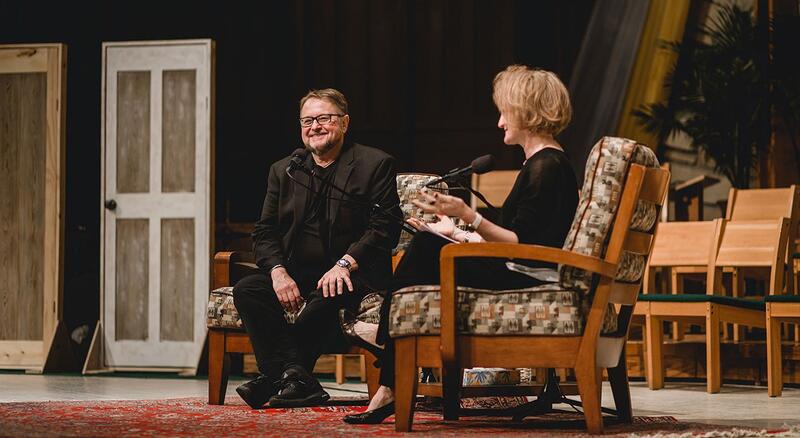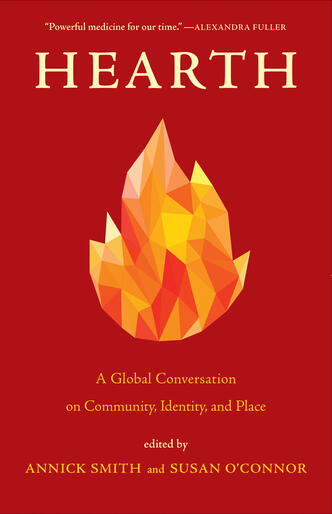There is No Them; There is Only Us: An Excerpt from Hearth

Luis Alberto Urrea with On Being’s Krista Tippett. Photo Credit: On Being.
Editor’s Note: On a recent episode of the podcast On Being, Luis Alberto Urrea appeared in conversation with host Krista Tippett, during which he discussed what borders are really about, what we do with them, and the fullness of what it is to be Mexican (and American). The deep truth of our time, he says, is that “we miss each other”—but his poem “Codex Hogar” and accompanying essay “Hearthland” make the faces and narratives of his home and borderland so vivid as to be unmissable. “I am and will be Other,” Urrea writes, “until I write you into my heart and make you see my home as what it is. Just another extension of your own home. For there is no them; there is only us.” The following work appears in the anthology Hearth: A Global Conversation on Community, Identity, and Place (October 2018).
CODEX HOGAR
“Why should love stop at the border?”
—Pablo Casals
Uno.
You’d think
a desert teemed with heat, churned
volcanic with dusted daylong baking: precious
little warmth beneath the pyramid of night those hard
Christmas eves: we gathered before a kerosene heater burning
within its glass tower, blanketed and huddled on bare floors with the dogs
in chemical smell not at all like pine boughs: and aunts who did not decorate trees,
exhausted from long days working American bowling alleys, American tuna canneries, smoking
and giving us American gifts that my father would not allow: a teddy bear was not a gift for a Mexican
boy—and my aunt taking it back and giving me instead a cheap plastic pinball game I did not want, but
received in a stoic fashion though years later, all of them dead, I wish I had that ridiculous Woolworth’s
bear
to remember
anything soft
from that world
before the walls
loomed
over us.
*
Dos.
Your house might have perched on the side of a hill
miles south of the border, whatever that was. Somewhere
up there by the riverbed. Past the sidewalks where spray-
painted donkeys played the roles of zebras
for beer-drinking Americans calling everyone “Pancho”
and “Mamacita.” You could have been a child
who thought wonderful things: that Americans were
always drunk and were the ones who wore big sombreros,
that zebras came from Mexico. You might have been a skinny
girl whose name meant “Daisy” in translation. A girl who lived
in that house perched on that hill, where the neighbors had
outhouses and tuberculosis, but a girl whose roof looked out
across a small canyon to the city and its dusty trees
with whitewashed trunks and gazebos with old men too fat
to button their uniforms and too slack to blow their
trumpets well, but their bleating as sour as tamarind juice
was somehow beautiful with the sounds of old buses and
police whistles and the ten thousand insouciant
street dogs barking at children playing soccer in the park.
You might even have had that girl’s mysterious power
to hold out her fingers and attract wild birds
to tumble from the sky and grip her knuckles as if
they were her feathery rings. And you might have seen
when the family went to a rare restaurant meal together
the poor people from some dark South begging on the street
called Revolution. Seen how all modern nations only love
dead Indians and make for their ghosts tales of noble mystics
who are played in films by handsome Italians and Mexico City
rich kids in spray tans and $5,000 wigs, but send machine cavalries
after their living children: four-wheel drive Hemi horses
chasing Aztecs and Mayas and harrowing them to pens
in Wonderland. You might have walked beside my cousin
with her birdy fingers, and my aunt, after that plastic American
Christmas, smoking her Newports like a power station burning
cheap sulfury coal, already seeding the cancer in herself,
and the living India standing outside the chicken diner as beautiful
as anyone I had ever seen. Seeking alms like a gospel sojourner.
Almost black, she was—braids brilliant in that winter sun, rebozo
over her shoulder and slinging her dark child at long breast,
suckling in the long smoky crèche of the avenue—
and my aunt suddenly turning on her
and kicking her
and shouting,
“Dog!
Get away from us!”
You might have felt the world,
like we children did, spin away and become something
made of iron
and bullets.
*
Tres.
You’d think a desert
would be hot. But
away from sight
there were beds
made of paper
in boxes of cardboard
on hilltops of wraiths
and ghost walkers
where gulls haunted
the sleep of dogs
too old and sick
to run the streets
where trucks
dropped all the
broken things
both countries
threw at the border
like toys like boots
like plastic chairs
like cans of peaches
like televisions like
laptops like tables
like porn magazines
like Bibles like rotten
fish like run-over cats
like rabid raccoons like
worn-out zebras like
canisters of blood
from abortion clinics
like underwear like
burning horses
and Indians
from impossible lands
where it stayed hot
but trucks came
at any hour
and the sound of engines
meant dying time
had come ’round again
and there was nothing left
to eat
those Indians
slept on plastic
spread over mud
in their boxes
and blessed America
for the old blankets
born-again conquistadors
dropped from above
and their babies
coughed in the night
because they had never
felt such cold
as they found in the shadow
of the Great Wall
coughed until blood
fell from their lips
fell like beads
from some ancient raiment
and I know
because I was there
the year fourteen
of these small ones
died
on Christmas Eve
on a hill
where their mothers
could watch
the lights of California
where it was always warm
and where kings in golden planes
moved around the brilliant
hive like
magnificent
wasps.
HEARTHLAND
I have often and long written about the borderlands. Having been born and bred there, I consider myself as somewhat of an expert. Though no place on this earth reveals all its history and wonders to any observer, it does help to have lived there. And it gives any writer a great place to stand, that old dirt and shadow. It has been my experience, especially in the age of the Trumpion, that there is a shocking freakishness to the Mexican, Mexican-American, and borderlands narrative. New York editors, for example, need to be reminded that we are actually human beings. Washington politicians need to be reminded that we might actually love something south of the Great Wall.
I have said before, and I will say again, that Tijuana was a wonderland for me. I didn’t know we were not well-off. (I won’t honor our struggles with the word poor. Anyone who has read my early works will know all about real poverty.) I did nearly die of tuberculosis. And you could not drink the water. However, Tijuana was where the music was, and the dogs, and the food, and the colors, and that sacred summoning of spirits called Spanish. All the stories were there. All my ancestors.
There came Biblical failures of Eden, as they always do. Mine were twofold, and I tried to meld them in this poem. The first was my first encounters with the meek who shall inherit the earth. The invisible poor— invisible because we would not look at them. So the day I saw my beloved aunt kick an Indigenous beggar, I knew two things profoundly—yea, three things did I see. One: I was with that poor woman and loyal to her forever. Two: I was with the Indigenous people, whoever they were, and knew I would learn who they were. And the third lesson was witness. I would never look away. Selah.
The other lesson that the recent toxic election reminds me to suffer over and over, with women and Latina/os and Black citizens and people of good heart and will, was that once I came to the United States (my mother was American, so this, too, was home), I was suddenly called things I had never heard of. Greaser, wetback, pepper-belly, beaner, tacobender. I learned that we were not human. We were Other. Because of some line that a commission decided to etch on some map (not smart enough to draw the boundary a few miles south so they could steal the mouth of the Colorado River and the top of the Sea of Cortez, thus costing the United States a potential powerhouse port system and utter control of the river). And this mythos of wall-building was just more calling of names. Names in brick and mortar and wire and steel. And thus, my fourth lesson in home: I am and will be Other. Until I write you into my heart and make you see my home as what it is. Just another extension of your own home. For there is no them; there is only us.
“Codex Hogar” and “Hearthland” by Luis Alberto Urrea appear in Hearth: A Global Conversation on Community, Identity, and Place, edited by Annick Smith and Susan O’Connor. Milkweed Editions, 2018.

